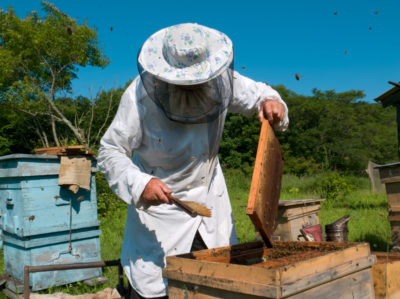As homesteaders and peppers, we tend to think that we wrote the book on preparedness and self-sufficiency. The simple truth of the matter is that the real book on preparedness was written by the humblest of God’s creatures, the insect. More specifically, the honey bee.
Honey bees put us to shame when it comes to preps. Bees forage to meet all their food needs, store enough to get them through the winter months and provide a large surplus, do all their construction projects with materials they have manufactured from materials they gather in the wild, and even stock natural medicinal supplies. The humble honey bee is arguably the best livestock partner a pepper or homesteader can have, providing a wide range of products and services that are indispensable in normal times as well as in a long-term survival situation.
The benefits of keeping bees are wide and varied. We began keeping bees in order to ensure that our fruit and vegetable crops would be pollinated. This is a huge benefit derived from keeping bee hives on a homestead. We have a tendency to take bees for granted in this role, but the sad truth of the matter is that honey bees are in real trouble. Colony collapse disorder, mites, pesticides, and GMO crops are all culprits in the mystery of the vanishing bees. Colony collapse disorder is not well-understood, but it is taking a huge toll on both commercial and hobby bee-keeping operations. There have been many reports of mass colony mortalities in association with plantings of certain Monsanto GMO corn seed, nearby bee keepers loosing up to half their hives following planting.
Regardless of the perpetrators of colony mortalities, the best way to ensure the presence of these crucial players in pollination is to keep one or more hives on the premises. Keeping bees imposes a commitment to farming and gardening using organic and limited pesticide methods. The good news is that these methods make the most sense for preppers and homesteaders anyway, both in terms of supplies that will need to be stockpiled and in the overall health benefits for your family. We have gone so far as to make the rounds of the neighborhood to inform neighbors that we have bees at our place. We let them know that the bees are a benefit to all of us, and that they are highly susceptible to certain pesticides. We have requested, in particular, that they refrain from using dust forms of pesticides. Dusts are gathered by bees like pollen and taken back to the hive; they can wipe out a colony in short order.
The Ultimate Guide to Keeping Stronger Colonies and Healthier, More Productive Bees
Aside from pollination, the next most obvious benefit of keeping bees is HONEY! A strong hive can provide as much as 50 pounds of honey per year. Honey is one of nature’s finest food sources. Raw local honey is not only a great sweetener, but also helps develop your immune system and fights allergies. Honey can be stored indefinitely without any processing or preserving. It is a great source of calories and it can replace sugar in baking and canning, it is also an effective topical antibiotic. In addition to providing for your family, surplus honey offers a source of income in normal times and is one of the best barter items you could hope for in the event of any long-term disruption to the financial or social order.
The next item in the bee hive supermarket is wax. Bees wax can be used to make long-burning, drip-free candles, great for grid down lighting or romantic dinners. Bee’s wax is a key ingredient of natural lip balm, when Chap Stick is no longer available. It can be used as a hardener in homemade soaps, extending their life. There are a host of other uses for bees wax ranging from waterproofing leather to waxing your wood furniture. Again, a source of bee’s wax won’t let you down in a long-term crisis situation.
There are a couple of lesser-known bee products of medicinal and nutritional value. One such product is propolis, which is the glue that bees make to repair and weatherproof their hives. It has antibiotic properties that can be used to fight infection. Some research indicates that propolis has anti-inflammatory qualities, and may be useful in treating a variety of ailments. It has also been suggested that propolis has anti-viral and wound-healing properties. Propolis can be collected from hives and would be good to have available should the pharmacy be shut down.
Finally, bee pollen is one of the most complete and compact foods in nature. Pollen is full of vitamins, minerals, enzymes and proteins. Bee pollen has been used for centuries in Chinese medicine to boost energy, fight acne, fight depression, aid in indigestion, and improve blood pressure. Pollen traps can be installed on hives to collect pollen.
Contrary to popular belief, bees can be kept anywhere. Rural homesteaders and preppers will have no trouble finding a convenient spot to locate a hive or two. With a few precautions, such as a small fence to keep kids and pets from stumbling into it and an obstacle that forces bees to fly high on the way out of the hive, suburban preppers can keep a hive in the backyard. The obstacle will disperse bees on their way out to forage, preventing concentrated stream of bees in your neighbor’s yard. Neighbors should be made aware of your bees, and efforts should be made to discourage them from using chemical pesticides (Again, dust-type pesticides are the worst offenders). With a few common-sense precautions even urban preppers can keep bees. Hives can be placed on balconies or rooftops.
Once you have made the decision to add bees to your life, you will have to decide on your methods. There are two primary ways of keeping bees, which differ in hive type and level of manipulation to the colony. These methods are the Langsroth hive, and the Top Bar hive.
Langsroth hives are the most common type. These are the boxes we are all accustomed to seeing. In a Langsroth hive, the bees are provided with frames and foundation on which to build their comb. Foundation can be either wax or plastic, but in either case it is a sheet with a cell template embossed on it. Most of the bee keepers I know prefer a wax foundation, plastic takes up space that provides no product while wax becomes part of the harvest.
Discover the pleasure that can be found in harvesting and eating your own honey.
The bottom boxes in a Langsroth hive contain the queen and the brood (baby bees). The bottom boxes, or hive bodies, are also where your bees will store their personal stash of honey to get them through the winter. As the season progresses, additional boxes, called honey supers, are added. Honey supers are where your goodies are deposited for you. These hives require quite a bit of monitoring, and should be checked about every other week in the warm months to prevent swarming and monitor production. Hive checks will inform your decisions regarding harvest and placement of additional supers. They are also a time to clean up extra wax and propolis which can build up and bind all your frames together.
Langsroth bee keeping involves quite a bit of expense and equipment to start off. It is also labor intensive. On the plus side, this is the most common method which makes finding coaches and teachers rather easy. Experienced local bee keepers are your best learning resource. Books are great but people are better.
The second hive type in common use is the top bar hive. Top bar bee keeping utilizes more “natural” methods, and thus requires a lot less monitoring and manipulation. These hives are oriented horizontally rather than vertically, bees build outward instead of upward into supers. Top bar bee keeping can be more of a do-it-yourself activity. Hives are easily built by folks with rudimentary wood-working skills, and no frames or foundations are required. These hives are essentially a long box with a cover. Pieces of wood are laid across the top under the cover; this is where the bees hang their comb. Top bar hives are monitored periodically through the season, and honey is harvested as the hive fills. Beyond this, the bees are left to their own devices. This method is less time-consuming, but may have lower yields.
With either method, you should invest in good personal protective gear. I recommend a bee suit, gloves and hood. I also recommend using a smoker. Smoke pacifies the bees, causing them to eat honey which virtually puts them to sleep.
Honey processing can be as simple or complex as you want or can afford. Methods range from mechanical extractors to a bucket and filter. Honey harvested from top bar hives can’t be processed in an extractor since the comb is not on a frame, thus eliminating even more potential equipment costs.
Before embarking on your bee keeping journey, do your research. Read some books, surf the web, and most importantly talk to people. Informed decisions are the best decisions!
Bees have gotten a lot of bad press. They are actually amazingly docile and easy to work with. They can be passive neighbors, presenting little or danger with a bit of common sense on your part. They are nature’s little preppers, and can make great partners in your prepping plans. They aren’t for everyone, and do require a bit of work and a new skill set. If bees fit your lifestyle, they could prove to be one of your most valuable preps.
 Off The Grid News Better Ideas For Off The Grid Living
Off The Grid News Better Ideas For Off The Grid Living





